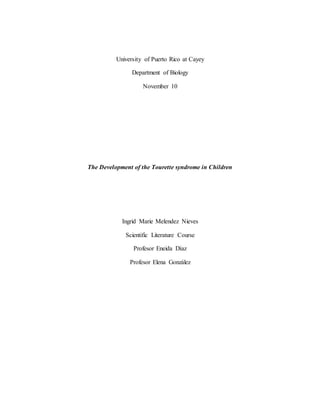
University of puerto rico at cayey review article
- 1. University of Puerto Rico at Cayey Department of Biology November 10 The Development of the Tourette syndrome in Children Ingrid Marie Melendez Nieves Scientific Literature Course Profesor Eneida Díaz Profesor Elena González
- 2. Abstract Tourette's syndrome is one of the most complex problems of nervous tic. For years there have been studies that confirm that the largest number of patients is children. Different studies show that cases of children with this syndrome indicate that as they grow, the syndrome disappears. Moreover, the probability that this syndrome occurs is four times higher in boys than in girls. It is important to keep in mind the complications of this syndrome, and it is possible that genetic material has to do with the development of the syndrome in children. For most people, when they enter adulthood the syndrome disappears. But there are those that in adulthood present it in a more complicated way. For others, the syndrome perhaps in their youth disappears and then late adulthood reactivates the syndrome again. It is believed that these variations are due to their genetic material. Table of content I. Abstract..................................................... 2 II. Introduction...............................................2-3 III. Clinical Investigations………………….3 IV. Children with the Syndrome: Risks………3-4 V. Possible treatments……………………...4 VI. Conclusion.................................................4-5 VII. Cited Bibliography.....................................5 Introduction Over 100 years ago, a French physician, Georges Gilles de la Tourette wrote an article in which he described nine children who had suffered from involuntary
- 3. movements, sounds, and rituals or compulsive behaviors. In his honor, this condition is referred to as the symptoms of Gilles de la Tourette’s syndrome. There are many types of tic disorders, but this review paper is about TD (Tic Disorder). Comorbidity with obsessive-compulsive disorder and hyperactivity are related such as attention deficit, hyperactivity disorder (ADHD), obsessive-compulsive disorder (OCD), anxiety and depression. Fernando (2002) studied the severity and relation of different disorders like DT and TD with comorbid TOC or ADHD. He examined the severity of tics, the measures of psychopathology, and other comorbid diagnoses (Fernandez 2002) Tics may occur many times during the day, but they tend to improve or worsen at different times, and may change over time. Symptoms usually get worse before the year in mid-adolescence. Clinical investigations Tics usually begin between the ages of 6 and 8 and are sudden. People who experience this syndrome have a variety of different sensory problems, including premonitory urges, prior tics, and somatic hypersensitivity due to impaired sensor motor suppression. There are conditions such as stress, anxiety, and that cause tics. Relaxation, exercise, or practicing sports help control tics. Ninety percent of children with the syndrome also have comorbid disorder such as attention deficit hyperactivity disorder (ADHD), obsessive-compulsive disorder (OCD), or an impulse control disorder conditions. In the evaluation of the syndrome, these additional syndromes should be evaluated as these relate to each other. Most children develop a normal lifestyle as they enter adulthood (Cohen et al. 2012). Children with the syndrome: Risks
- 4. According to Roessner et al. (2010) the Tourette syndrome is a disorder of a combination of both vocal and motor tics (arm thrusting, blinking eye, jump, kicking, clarification of the throat and shoulder shrugging). This research is helpful to the scientific community, because it leads to more deeply know the origin and development of mental disorders and their relationship with tic disorder and Tourette syndrome. About one in 100 people has Tourette syndrome. Often occurs with other problems, such as attention deficit, hyperactivity disorder (ADHD), obsessive-compulsive disorder (OCD), anxiety and depression. This syndrome is more common in children, because they are born with genetic characteristics that make inherit this condition. As time passes, most symptoms are lost forever, but others can live with it all of their lives or maybe they reappear as adults. Possible Treatments Due to the strong impact of Tourette syndrome in children, different treatments have been developed. That is why there have been various studies involving an analysis of how effective certain treatments can be. Topiramate is used alone or with other treatments to prevent or control certain conditions. Controlled trials evaluating topiramate for children with Tourette syndrome were found (Chung- Song et al. 2013). Two reviewers independently selected agents’ trials, assessed quality, and extracted data, these agents after several attempts at testing; the results were not the best. The current results are promising, but still not enough to support the routine use of topiramate for Tourette syndrome in children due to the poor quality of experimental study designs. They must be confirmed with the highest quality placebo controlled trials. Conclusion
- 5. After many years of research and studies of tics and Tourette syndrome, it is clear that for this condition little about its origin and development are unknown. According to studies, the most likely to be victims of this condition are children. It's funny how this condition disappears with time and then can appear in adulthood. Finally, there is no cure for Tourette syndrome (TS). Yes there are treatments to help control tics caused by the condition. Many people with TS have tics that do not disrupt their daily activities and, therefore, do not need treatment. However, there are medications and behavioral treatments for cases in which the tics are painful or cause injury, and interfere with school, work or social life, and cause stress. Cited Literature Cohen S, Leckman J, Bloch M. Year Neuroscience & Biobehavioral Reviews. Clinical assessment of Tourette syndrome and tic disorders. [Internet](Cited 2012 September 14) http://www.sciencedirect.com/science/article/pii/S0149763412002035 Black K., Jankovic J., Hershey T,. McNaught K,. Mink J,. Walkup J. Progress in research on Tourette syndrome. [Internet] (February 2012) Fernandez E, 2002. Comorbids disorders associated with tics. Rev Neurobiology 34 Suppl 1:S122-9 [Internet] (cited 2002 February) http://www.ncbi.nlm.nih.gov/pubmed/12447802 Rothner D, Rajan P, Ghosh D, Das D, Datta P, Erenberg G. 2014. Sleep disorders in Children with Tourette Syndrome. Pediatric Neurology 51 (1):31-35. [Internet] (cited 2014 January 21) DOI: http://dx.doi.org/10.1016/j.pediatrneurol.2014.03.017
